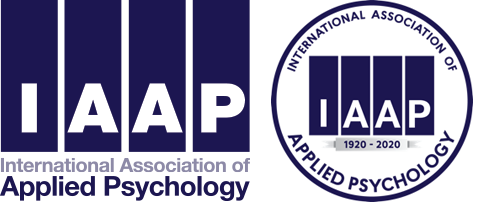History of IAAP
Psychology as a formal discipline is now well over 100 years old, having been recognised officially with the establishment of Wundt's experimental laboratory in Leipzig in 1879. Its centennial was celebrated in 1980 at the International Congress of Psychology in Leipzig in honor of this great event in the history of psychology. The international movements in psychology are not far behind in age. From these movements three major general international psychological associations have sprung up and are still flourishing. They are also still sponsoring quadrenniel congresses or annual conventions, although until 1976 when the International Congress of Psychology was held in Paris, this was not always de case. These three international organisations are:
- International Association of Applied Psychology (IAAP), sponsor of International Congresses of Applied Psychology
- International Union of Psychological Science (IUPsyS), sponsor of International Congresses of Psychology
- International Association of Cross-Cultural Psychology (IACCP), sponsor of International Congresses of Cross-Cultural Psychology
The International Association of Applied Psychology (IAAP) or Association Internationale de Psychologie Appliquée (AIPA) is the oldest international association of psychologists. It was founded in 1920 as the International Association of Psychotechnology or Association Internationale de Psychotechnique. The association was known by this name until it was changed to the current name in 1955 during the tenure (1953-58) of Clifford Frisby, who was the first non-French speaking president. Frisby, incidentally, was also a nonpsychologist; he was a business man and is the only such president to have served in that office in IAAP. He was the head of the once-great National Institute for Industrial Psychology in Great Britain which, in the 1920s, led the world in industrial psychology and vocational guidance.
The Association is responsible for organising the International Congress of Applied Psychology. The past congresses of IAAP, the city, country and year win which each was held and the name of the organizer of the congress are as follows:
| CONGRESS | CITY, COUNTRY | YEAR | PRESIDENT of CONGRESS |
| I | Geneva, Switzerland | 1920 | E. Claparède |
| II | Barcelona, Spain | 1921 | E. Claparède |
| III | Milan, Italy | 1922 | G. Ferrari |
| IV | Paris, France | 1927 | E. Toulouse |
| V | Utrecht, Holland | 1928 | N. Roels |
| VI | Barcelona, Spain | 1930 | E. Mira i López |
| VII | Moscow, USSR | 1931 | N. Spielrein |
| VIII | Prague, Czechoslovakia | 1934 | R. Seracky |
| IX | Bern, Switzerland | 1949 | H. Pieron |
| X | Göteborg, Sweden | 1951 | J. Elmgren |
| XI | Paris, France | 1953 | F. Bonnardel |
| XII | London, UK | 1955 | C. Frisby |
| XIII | Rome, Italy | 1958 | T. Canstrelli |
| XIV | Copenhagen, Denmark | 1961 | R. Tranekjaer |
| XV | Ljubljana, Yugoslavia | 1964 | Z. Bujas |
| XVI | Amsterdam, The Netherlands | 1968 | N. Wijngaarden |
| XVII | Liège, Belgium | 1971 | R. Piret |
| XVIII | Montreal, Canada | 1974 | L. Dorais |
| XIX | Munich, Germany | 1978 | R. Amthauer |
| XX | Edinburgh, UK | 1982 | G. Randell |
| XXI | Jerusalem, Israel | 1986 | Y. Amir |
| XXII | Kyoto, Japan | 1990 | J. Misumi |
| XXIII | Madrid, Spain | 1994 | J.M. Prieto |
| XXIV | San Francisco, US | 1998 | J. Matarazzo |
| XXV | Singapore | 2002 | E. Nair |
| XXVI | Athens, Greece | 2006 | J. Georgas & M. Manthouli |
| XXVII | Melbourne, Australia | 2010 | P. Martin |
| XXVIII | Paris, France | 2014 | C. Roland-Lévy |
| XXIX | Montreal, Canada | 2018 | P. Graf & D. Dozois |
| XXX | Beijing, China | 2022 | Z. Khang |
| cancelled due to the Covid-19 pandemic | |||
| XXXI | Florence, Italy | 2026 | G. Scaratti |
Beginning with the IUPsyS Congress in Paris in 1976, IAAP Congresses started to be organized on a four-year cycle.
The IAAP was organized primarily to establish contact and communication among psychologists on an international scale. For the first 50 years of its existence, the Association, although international in nature and in scope, was dominated by European psychology and psychologists. This fact is emphasized by noting who its principal officers were, where its congresses were held, and the nationalities of the organizers of those international meetings. While many Americans and other non-Europeans were members of the Association in those early days, they did not assume major leadership roles. Perhaps much of this was due to the earlier emphasis in psychology outside of Europe (particularly U.K. and France) on experimental and theoretical psychology rather than clinical, counseling, and industrial psychology.
All of this seems to have changed with the 1974 Montreal Congress, the first to be held outside of Europe. And after the congress held in Kyoto, ICAP moves from continent to continent.
PAST EXECUTIVE OFFICERS
Until 1986 the officers of the IAAP were President and Secretary/Treasurer, with varying years of tenure for each office. During the Congress held in Jerusalem, the office of the Vice President was replaced by President-Elect, and the limit of the office of the President to four years was adopted to begin in 1990. During the Congress held in Kyoto, the office of the Secretary and Treasurer were separated.
LIST OF IAAP PRESIDENTS
- Edouard Claparède, 1920-1941
- Henri Piéron, 1947-1953
- Clifford B. Frisby, 1953-1958
- Morris S. Viteles, 1958-1968
- Gunnar Westerlund, 1968-1974
- Edwin A. Fleishman, 1974-1982
- Claude Lévy-Leboyer, 1982-1990
- Harry C. Triandis, 1990-1994
- Bernhard Wilpert, 1994-1998
- Charles Spielberger, 1998-2002
- Michael Frese, 2002-2006
- Michael Knowles, 2006-2010
- Raymond Fowler, 2010-2011
- Jose Maria Peiró, 2011-2014
- Janel Gauthier, 2014-2018
- Christine Roland-Lévy, 2018-2022
- Lori Foster, 2022-present
IAAP SECRETARIES/TREASURERS
- Jean-Maurice Lahy, 1920-1943
- Franziska Baumgarten-Tramer, 1947-1951
- Raymond Bonnardel, 1951-1964
- Gunnar Westerlund, 1964-1968
- Roger Piret, 1968-1980
- Charles J. De Wolff, 1980-1990, secretary/treasurer
- Michael Knowles,1990-1998, secretary-general
- Rita Claes, 1990-1998, treasurer
- Raymond Fowler, 1998-2006, treasurer
- Elizabeth Nair, 2006-2014, treasurer
- José M. Prieto, 1998-2006, secretary-general
- Janel Gauthier, 2006-2013, secretary-general
- Milton D. Hakel, 2013-2014, secretary-general
- Buxin Han, 2014-2018, secretary-general
- Lourdes Munduate, 2014-2020, treasurer
- Christina Sue-Chan, 2018-2020, secretary-general
- Kurt Geisinger, 2020-2026, treasurer
- Pedro Neves, 2020-2022, secretary-general
- Luminita Patras, 2022-2024, secretary-general
- Pedro Altungy, 2024-present, secretary-general

